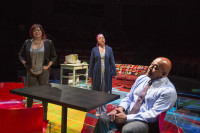
By Barbara Smith
A character map is included in the program of “Water by the Spoonful,” tracking the links between the characters, and this Pulitzer Prize-winning play by Quiara Alegria Hudes, playing now through May 11 at the Old Globe, is first and foremost a character-driven play. On the surface, the connections are clearly delineated, but as the story unfolds, the relationships become deep and more complex, some linked by family, some by shared experience. The second in playwright Hudes’ acclaimed Elliot Trilogy—the first is “Elliot, A Soldier’s Fugue,” and the third “The Happiest Song Plays Last”–the production is at once exhilarating, introspective, painful and ultimately uplifting.
The play begins with a spotlight on Elliot, an Iraq war veteran, center stage, boxing an invisible opponent. The scene is an imprint for what is to follow, for each of the 7 characters in the play are fighting demons and nursing wounds, some visible, some buried deep but, like bubbles ready to burst, working their way to the surface.
The bulk of the action takes place in an imaginative and oddly intimate rendering of an Internet chat room. Elliot Ortiz (Rey Lucas) has returned from Iraq, wounded and haunted, but his connection with his cousin Yazmin (Sarah Nina Hayon), a music teacher, helps to ground him. Both have a strong connection to Ginny, aunt and mother to the two, whose health is failing. Both too are estranged from Odessa, aka Haikumom (Marilyn Torres), who moderates a chat room that is, as one character describes it “for crackheads who don’t want to be crackheads anymore.” Her true connection to Elliot is revealed only after the three confront painful issues from the past. We come to know the other denizens of this mind- bending chat room primarily by their screen names. Chutes and Ladders (Keith Randolph Smith) is an African American man who works for the IRS and whose 12-step inspired one-liners have an eerie ring of truth if only he could practice what he preaches himself.: “The only way out is through,” “Nothing changes if nothing changes,” and a few other well-stated but unprintable utterances. Orangutan (Ruibo Qian) is Japanese-born but raised in the US, and, in a fervent wish to connect with her biological parents, travels to Japan, even against Chutes’ warnings of the perils of stepping back into the shadows. Fountainhead is a formerly successful business executive who is now unemployed and, in agonizing denial, unwilling to admit to his addiction to his wife. A ghost (M.Keala Milles, Jr.) is a re-appearing presence throughout the play, speaking words in Arabic that torment Elliot.
Directed by Edward Torres, the play features an ensemble of talented, top-notch actors. Sarah Nina Hayon as Yazmin Ortiz is vibrant with a powerful, stage presence. Marilyn Torres’ Odessa brings to the fore humor, strength and finally pathos when her own demons catch up with her. Keith Randolph Smith as Chutes and Ladders radiates warmth and charisma, especially as his character steps out from his own shadows into the light. Rey Lucas as Elliot, Robert Eli as Fountainhead, Ruebo Qian and M. Keala Milles, Jr. round out the cast with fine performances as well.
Alegria is a master of the spoken word, and the characters’ dialogue is a soaring mix of street vernacular and lyricism, woven together expertly and eloquently. Music figures prominently in the play, with jazz as a continuing motif. Yazmin introduces the concept of dissonance—opposing chords in music–as a gateway to resolution, citing jazz master John Coltrane’s opus “Ascension,” not just as a movement in music but as an underpinning in life. Water as a metaphor of nourishment, cleansing and redemption is another effectively placed element of the play.
With its many layers, the play is not an easy one to process in one viewing, and more than one audience member was heard to say they would come to another performance if just to deconstruct and parse out the deeper meanings. Hudes, who is of Jewish and Puerto Rican heritage, tackles themes of identity, borders and boundaries, and ghosts of war. It is dense, expansive work and, in the hands of a lesser playwright or less skilled director, would not have the grace in style and substance that marks this production. Hers are unforgettable characters and you don’t have to be a crackhead or an addict to see something of yourself in them. With only a few performances left, “Water by the Spoonful” is a theatrical wellspring you don’t want to miss. For ticket information, visit www.theoldglobe.org.

